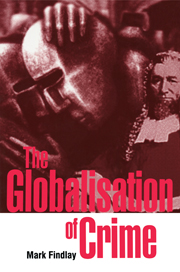Book contents
- Frontmatter
- Contents
- Preface
- Acknowledgements
- Introduction: Notions of context and globalisation
- 1 (Mis)representing crime
- 2 Crime and social development
- 3 Crime and social dysfunction
- 4 Marginalisation and crime relationships
- 5 Crime economies
- 6 Crime as choice
- 7 Integrating crime control
- Epilogue
- Bibliography
- Index
3 - Crime and social dysfunction
Published online by Cambridge University Press: 22 September 2009
- Frontmatter
- Contents
- Preface
- Acknowledgements
- Introduction: Notions of context and globalisation
- 1 (Mis)representing crime
- 2 Crime and social development
- 3 Crime and social dysfunction
- 4 Marginalisation and crime relationships
- 5 Crime economies
- 6 Crime as choice
- 7 Integrating crime control
- Epilogue
- Bibliography
- Index
Summary
Crime and dysfunction
Social disorganisation, social pathology or social dysfunction are analytical contexts in which the determinist relationship between crime and society are clearly suggested (see Young, 1981). In the literature of crime theory, social disorganisation is a comparative state where the structures and relationships of society are said not to reflect those of modern, middle-class, materialist communities. Social pathology is coined in settings where particular features of disorganisation are taken by promoters of the dominant morality to indicate a ‘sick society’.
Social dysfunction assumes that the operational product of social relationships should work towards an organised and healthy society. This is when measured against the dominant morality, and form of social order compatible with the expectations of modernisation and development. Obviously, each of these descriptions is an oversimplification of how complex societies operate and indicates much about the conceptual assumptions of the theories in which it (social dysfunction) is employed.
Where socio-economic development, moving towards modernisation, is a creed of global commerce, transnational finance, and free-market politics, ‘underdevelopment’ or ‘third-world’ status stigmatises cultures in contexts preceding modernisation. Cultural and social dysfunction is evidenced in choices which are not compatible with a development paradigm.
As the bonds of global socialisation seem currently dependent on the ideologies of democracy, market economics and development, the traits of dysfunction are seen as challenging such ideologies. Westernisation equates with the functional society, and Western values are those to be held by the functioning citizen.
- Type
- Chapter
- Information
- The Globalisation of CrimeUnderstanding Transitional Relationships in Context, pp. 94 - 114Publisher: Cambridge University PressPrint publication year: 1999



